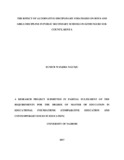| dc.description.abstract | The study investigated the effectiveness of alternative discipline management strategies on secondary school students in Githunguri sub-county. The overarching objective was to examine how, and whether, guidance and counselling, peer counselling, and collaborative decision-making are better alternatives to the hitherto pervasive disciplinary strategies such as suspension and corporal punishment. The research adopted a descriptive survey design. Out of a population of 30 schools, 9 schools were purposively selected thus 9 school principals, 9 deputy principals, and 9 guidance and counseling teachers comprised the sample for teachers. The respondents also included 81 students. Data was gathered through questionnaires and interviews schedules. Both quantitative and qualitative techniques were used to analyze data. The study found that while majority of the schools preferred guidance and counseling as a discipline management strategy, very few schools had trained guidance and counseling teachers. Moreover, many teachers viewed guidance and counseling as lengthy and thus resorted to more instantaneous measures such as punishment. Peer counseling was found to be a strategy preferred by majority of students. However, schools did not have the requisite supports and frameworks for such and thus quantifying the success of peer counseling was problematic. It was found, too, that many schools have adopted collaborative decision making whereby students are encouraged to participate in decision-making. This is through class discussions and elected student councils. This, however, is inhibited by lack of time due to overloaded school schedules. The study recommended that teacher education programs should foreground alternative discipline management training for teacher education students. Schools, too, should be encouraged to mainstream dialogue with students instead of relying on punitive strategies such as corporal punishment and suspension. Moreover, there is need for greater oversight by the education ministry to ensure that schools commit seriously to the laid down policies on participative school management entailing greater participation by students. | en_US |



